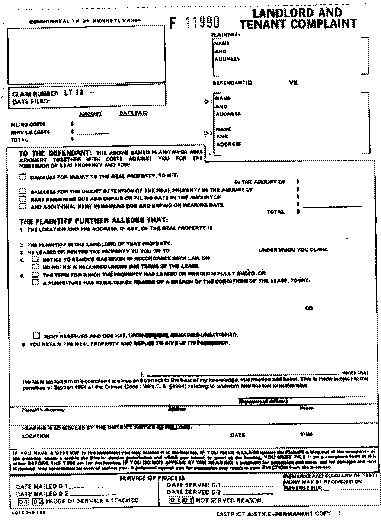|













| |
Guidelines for Pennsylvania
Residential Eviction
Non-Payment of Rent

Please
note: This information and forms are applicable for residential
evictions only
TYPICAL LANDLORD AND TENANT COMPLAINTS
The likely reasons a landlord may file a
complaint in the Landlord/Tenant Section of the Pennsylvania Court,
Special Civil Part, include:
 | Failure to pay rent. |
 | Continued disorderly conduct. |
 | Willful destruction or damage to property. |
 | Habitual lateness in paying rent. |
 | Violation of rules and regulations, after written notice to comply,
as outlined in a lease or other document. |
 | Tenant's conviction for a drug offense.
|
NOTICE
Before filing most complaints, a landlord must
give a tenant written notice to correct a lease violation. A landlord may
only proceed to file an eviction lawsuit if a tenant fails to correct the
violation within the statutory notice period.
In Pennsylvania a landlord or a tenant
that is a corporation must be represented by an attorney in all matters
filed in the court. No landlord or tenant may be represented by anyone
other than a lawyer.
THE PROPER EVICTION PROCEDURE
The Landlord-Tenant Law of 1951 points out the only method for a landlord
to evict a tenant. The Landlord-Tenant Law does not apply to people who are
buying a home or who live in a hotel or rooming house.
- The Eviction Notice - The landlord must give the tenant
written notice of the reason for the eviction and the date that the
landlord wants the tenant to leave. NOTE: A written lease may provide
for giving up the right to receive this eviction notice. The eviction
notice must be personally delivered to the tenant or posted on the
dwelling. An eviction notice, sent by mail is probably not enforceable.
A written lease may state how many days notice must be given by the
landlord before the landlord can evict. It the lease does not state how
much notice is required, the general rule is as follows: If the term has
ended, or it the landlord claims the tenant has breached the lease, the
landlord must give the tenant thirty (30) days notice if the lease is
for less than one year (this is usually month-to-month), and ninety (90)
days notice if the lease is one year or more. If the tenant is behind in
the rent and has an oral lease with the landlord, the landlord needs to
give only fifteen (15) days notice between April 1st and September 1st,
but thirty (30) days notice between September 1st and April 1st. It the
tenant is not out of the property by the end of the eviction notice, the
landlord must follow the procedure through the District Justice's office
as set forth in paragraphs 2, 3 and 4 below.
- Complaint - The form pictured below is a Landlord-Tenant
Complaint. The landlord files the complaint with the appropriate
District Justice's office, and the landlord receives a yellow copy of
the Complaint. The pink copy of the Complaint will be served on the
tenant by the Constable, who may hand the tenant the Complaint or tape
the Complaint to the door of the property. The tenant will also get an
orange copy of the same Complaint through the mail. The Complaint says
that a hearing will be held at the District Justice's office on a
particular day and time. The tenant should tell the District Justice if
the tenant intends to come to the hearing and present his/her side of
the case. The Complaint always requests possession of the property and
may ask for back rent or damages as well. If the landlord is also suing
for back rent or damages, see Suits for Money.
If the tenant has a claim to file against the landlord, this claim,
called a "counterclaim", may be filed before the hearing. Both
Complaints will then be heard at the same time.

- The Hearing - At the hearing, both the landlord and the
tenant will be put under oath to tell the truth. Either may have a
lawyer to present his/her case. The landlord will then take the stand
and present his/her case. When the landlord is finished testifying, the
tenant can cross-examine the landlord -- in other words, ask the
landlord any questions the tenant may wish to ask about the case. When
the landlord is finished presenting his/her case, the tenant takes the
stand and presents the tenant's side of the case. Again the landlord has
the right to question the tenant after the tenant has presented his/her
case. Both the landlord and tenant have the right to bring any papers,
pictures, or other evidence which is important to prove their case.
Either one can also bring any witnesses they may have.
The District Justice will decide whether or not the landlord is
entitled to a judgment for possession of the property. If the landlord
wins his/her case, he/she will get a judgment for possession and the
tenant must move out. If the tenant wins, the tenant may stay. The
District Justice may also decide whether or not either the landlord or
the tenant owes the other any money. (See Suits
for Money).
If either the landlord or the tenant does not agree with the decision
the District Justice reaches at the hearing, an appeal can be taken to
the County Court House within thirty (30) days after the District
Justice makes his decision. Either the tenant or the landlord will need
a lawyer's help in filing this appeal. If either the landlord or the
tenant does not attend the hearing he/she will receive notice from the
District Justice which says what the District Justice's decision was and
on what date the decision was entered.
- Order for Possession - If the landlord wins a judgment for
possession, which means the tenant must move, the landlord can then
enforce the judgment. This means that no sooner than fifteen (15) days
after the District Justice makes his decision and enters the judgment
for possession, the landlord can have the constable give the tenant an
"Order for Possession". This Order for Possession is a notice telling
the tenant that unless the tenant is out of the property by a date set
on the notice (no sooner than fifteen (15) days after the date the
tenant receives the notice) the Constable or Sheriff can forcibly set
the tenant and his/her belongings out of the house or apartment. This is
a total of at least thirty (30) days after the judgment for possession
was entered.
If the Constable has to forcibly evict the tenant, and the tenant has
not arranged for a place for his/her furniture and belongings, the
Sheriff or Constable can store the furniture and belongings at a storage
company at the tenant's expense. A tenant must pay any storage bill
before getting his/her furniture and belongings back. If the tenant does
not pay the storage bill or make arrangements regarding the furniture
and belongings, they may be sold by the storage company to pay the
storage bill.
Landlord-Tenant Complaint (AOPC 310A) Filing Instructions
You need to have a copy of the Landlord Tenant Complaint for the Plaintiff,
two copies for each defendant and a copy with an original signature for the
District Justice office. You may photocopy the completed complaint to
produce the needed number of copies, including a copy for the defendant's
attorney. You will be charged filing costs and service costs when the
complaint is filed at the District Court. No changes may be made to this
form either in content or format.
Landlord-Tenant Complaint
(AOPC 310A) PDF

This page was last updated 8-5-2002
|
|
|